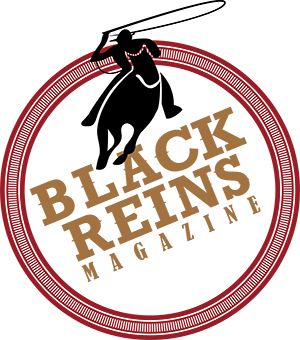How the Men of Semien Stables Are Redefining “Country” and Making it Cooler Than It’s Ever Been
by: Jacqueline Simien
“Black cowboys do exist … It’s real. I’m a real cowboy in my mind.”
And I believe Marcus Semien. I’m sitting across from the 41 year old, college educated, Omega Psi Phi Fraternity member, who’s also a starched down, crisp, long-sleeve shirt-wearing, cowboy hat sporting, proud black cowboy, who makes up one-third of the founding members of Semien Stables. Semien Stables is a group of family and friends based in Southeast Texas and Southwest Louisiana who share a love of family, Creole culture, and most of all horses. Sitting with us are two other black cowboys: Marcus’ father, 68 year old “Pop” Willie Semien Junior and Willie’s younger brother, 59 year old John Semien, and these men couldn’t be ignored, even if they tried.
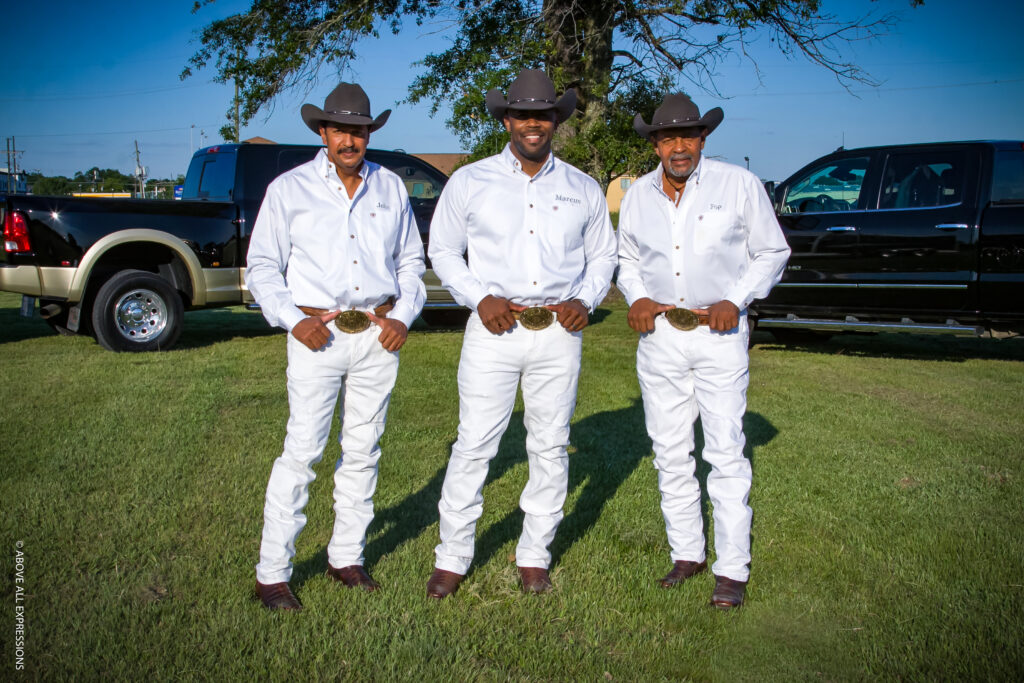
Semien Stables was birthed by “Pop Willie,” John and Marcus, who started out just going to trail rides. For the uninitiated, trail riding in Southeast Texas and Southwest Louisiana is usually a combination of live Zydeco music, a cookout, family and friends and horseback riding. Hundreds and perhaps even thousands of blacks in that part of the country spend many weekends, loading up their souped-up RVs, hitching their horse trailers and traveling many miles to enjoy such festivities. But in the early days of Semien Stables, it didn’t even have a name. It was just Marcus, Pop and John. And that was enough for them. The men are best friends. A rare trio of friends, considering their age differences. “I talk to my daddy, [and] my uncle everyday on the phone. If something ever happens to either one, I don’t know if I could recover,” Marcus says, in a tone that is unmistakably serious. He loves these men. And each of them share of love of family, creating memories with family and a love of horses, passed down from Pop and John’s father, Willie Semien Senior.
“The love of horses is embedded (in us),” Pop says, proudly. Marcus adds, “We were comfortable sitting on horses, before we even knew the dangers of horses.” The three men laugh, reminiscing how Pop and John’s mother, Marcus’ grandmother, Lucille, would often chide her husband, who’d put the kids atop horses when they were very young, saying, “Willie, don’t hurt them children!” John laughed, saying his dad’s reply was always, “I got‘em. It’s gonna be alright.”
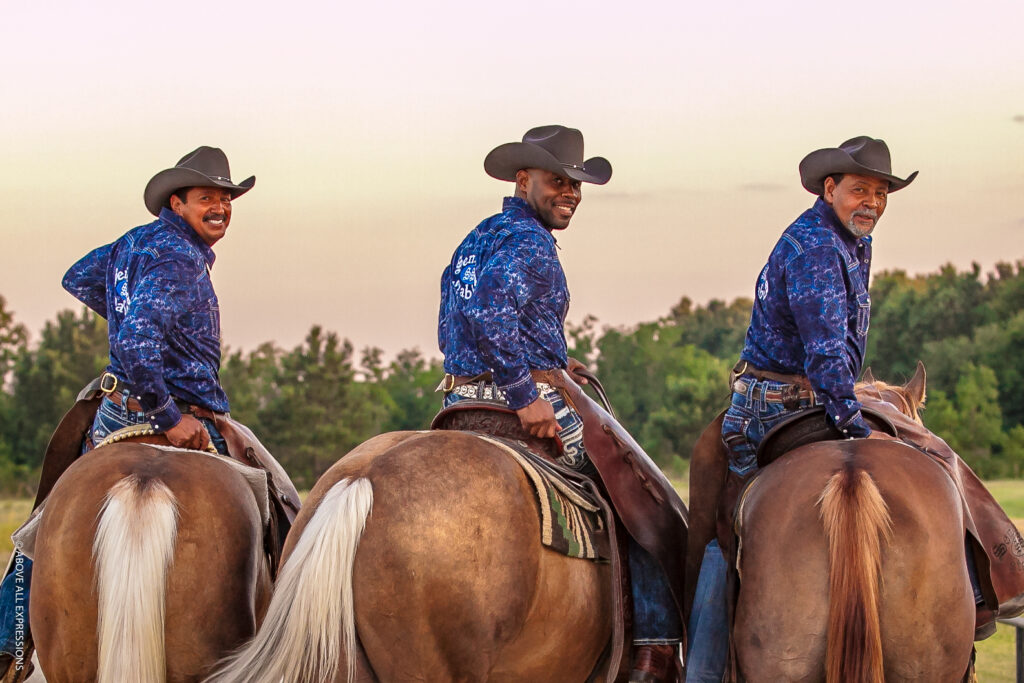
And it’s been more than alright for the family, since those humble days for the older Semien men. They grew up in Palmetto, Louisiana —an area so small, it’s considered a village, not a town, and as of 2016, had a grand total of 162 people populating the small area in St. Landry Parish, Louisiana.
Growing up in Palmetto, Willie Sr. and Lucille did their share to populate that part of the Opelousas-Eunice Micropolitan (not metro, but “micro”) Statistical Area. The couple had 12 children: Merricks, Barbara, Willie Jr. (Pop), Joseph, Patricia, Lynwood, Marie, Mildred, John, Mike, Octavia and Mary —not an uncommonly big brood for sharecroppers in 1960s Louisiana.
Pop and John say their mother, Lucille (née Malveaux), received only a third grade education, while they don’t believe their father, Willie, went beyond the first or second grade. But all 12 of the Semien children finished high school, even though it meant having to leave school early —around noon —during harvest time, between September and October. Pop says matter of factly, “It was a way of life.”
Also a way of life for the Semiens was hauling logs and hay, and for extra money, planting and cutting sugar cane, earning $5 to $8 dollars for their labor.
But the men speak of that time with such fondness, you almost think you’re not hearing them talk about work. And in a way, you aren’t. You’re hearing them talk about family. And it’s evident with every memory they share, they wouldn’t have changed a thing.
John proudly speaks of how he and his siblings had full meals, every day. “We used to race home from school to eat. Mom’s food was the best.” The Semien children ate, completed their chores, then did homework. That was the routine.
Pop continues saying, “Mom cooked on a wood burning stove. [We] didn’t always have electricity. [We’d use] kerosene lamps or coal oil.”
Another source of pride for the Semien men is the knowledge that every morning, before their father went out to work in the field, he made their mother a cup of coffee and took it to her, while she was still in bed. Pop and John both smile, as they speak of this.
If their mother and father could see how they began —and see them now. “We started with just the last name on back [of their shirts.] [We] were proud of our last name, proud of who we were, how we were raised,” Marcus explains. He finishes by saying, “We were known as the guys with the ‘big ole horses.’ If you didn’t know us as Semiens, you knew us as the guys with the ‘big ole horses’.”
They are known for that and a lot more, these days. No matter how hot it is at a trail ride, the members of Semien Stables will always be hotter —sometimes literally. “Even in 200 degree weather,” Marcus chuckles, “we’re in long sleeves.” He says when he’s seen without his cowboy hat, he’s jokingly told he’s “out of uniform.” Marcus was inspired to create a logo for Semien Stables because of his membership in Omega Psi Phi. Just as fraternities and sororities have symbols, Marcus wanted the same for Semien Stables. He also wanted something he didn’t notice with any other trail riding groups, but was impressed with when he saw it on the shirts of some men at a rodeo —the use of embroidery.
So, Marcus and a friend created the logo that’s seen on the backs (and sometimes on the front, for the female members) of Semien Stables shirts: Semien at the top, with the “S” in Old English font and “stableS” at the bottom, with the last “S” in Old English font. Between the words “Semien and stableS” is an oval, on its side with the letters “SS,” also in Old English font.
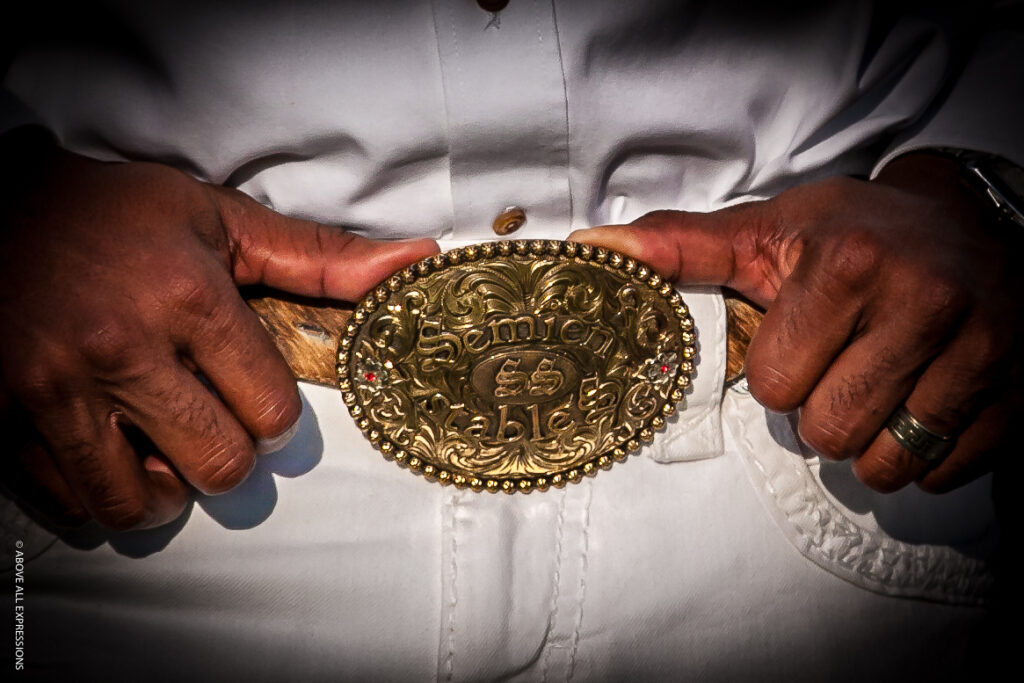
Marcus remembers his grandmother saying, “I just can’t believe y’all are riding [horses] in starched and ironed white shirts.” But he says it made her proud and they dress in such clean and perhaps uncharacteristic cowboy attire, as a tribute to Lucille —she loved how sharp they looked. And Willie Sr. was just as proud, with John recalling how his dad called their horses “grain fed,” because they were in such great shape. John believes they have what their father never could have, but yet their father “had it through his kids.” “[He] had an appreciation for what his kids accomplished.
And the accomplishments are for more than just appearance for the Semiens and Semien Stables. The Semiens have competed in horse shows, once winning the the Houston Livestock and Rodeo’s Top Yearling Stallion competition with a horse named Cayenne. They finished second as Reserve World Champions at the Palomino World Show in Tunica, Mississippi, with another horse from their stable, appropriately named (Boss). When others have discouraged them, telling them they couldn’t win in these competitions, Marcus’ response has been, “We’ve won by just being here.” John says there was a time he would look at magazines and just dream of going to these competitions. And now the Semiens are there. Representing. And doing it as they always have —with class and a yearning for perfection. “We have found more joy in losing than the winners have had in winning,” says Marcus. Now that, is the definition of class.
Perhaps one of their biggest accomplishments and what may go on to be their greatest legacy is the annual Semien Stables Trail Ride and Scholarship. It’s held the last weekend of April at the West-Cal Arena and Events Center in Sulphur, Louisiana. In its inaugural 2014 year, the Semiens partnered with “Step N Strut,” organizers of the largest trail ride in Louisiana, if not the world. Sulphur, Louisiana enthusiastically welcomed the Semien event, Marcus says, because they “went in with a plan, [that was] professional … we hit if off.” John says it takes about six months of preparation and they’ve had thousands of trail riders from California, Georgia, New York, New Jersey, Seattle and Kansas City —just to name a few far off places —not to mention all parts of Louisiana and Southeast Texas. They say the first year was like a family reunion.
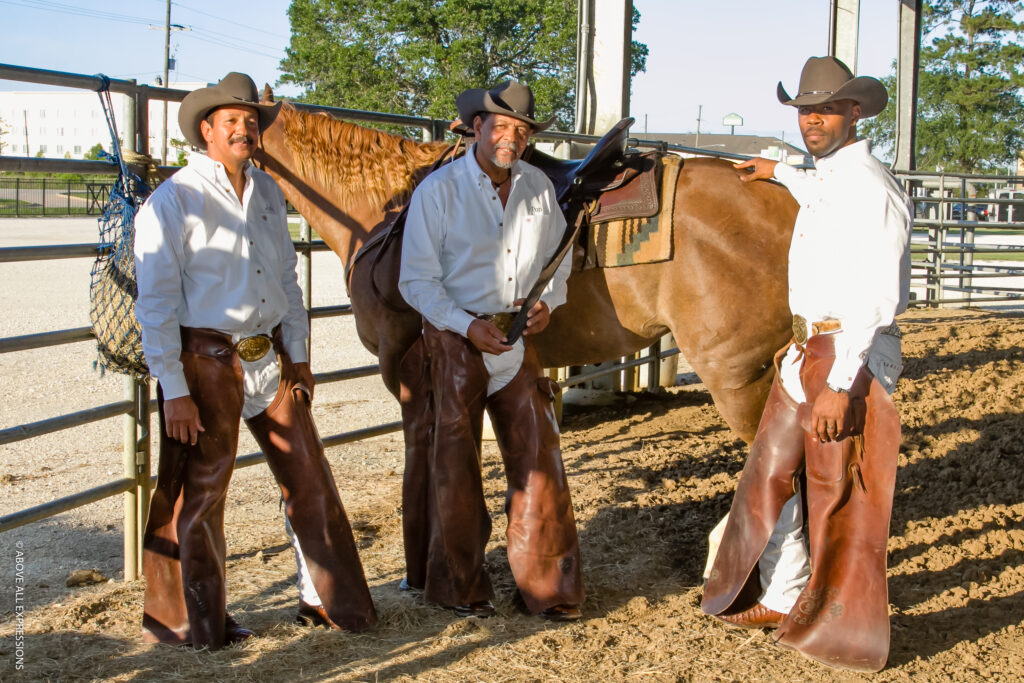
Among the featured Zydeco artists were Chris Ardoin, Brian Jack and L’il Nate. Over the years other big names in Zydeco, like Keith Frank and J. Paul Jr. have also performed. In addition, the Semiens award $500 scholarships from money raised at the event, to three Sulphur High School students, to show their appreciation to the city for allowing Semien Stables to host their event in the Southwest Louisiana town. The school selects the winners, based on grade point averages, SAT or ACT scores and community service. The Semien men remember that first year in 2014 as getting off to a more than a rough start. A tornado watch was issued for the area. But thanks to the covered accommodations of the arena, the trail ride guests were safe and the tornado watch was eventually dismissed. “The backbone [of the event] is family. The hospitality of the family. The only reason we can do it is because of family,” Marcus stresses —family that includes Pop’s wife, Carol, and six children: Carmen, Carlos, Marcus, Wyman, Prentiss, and Courtney; John’s wife, Janice, and children, Brent and Jada; and Marcus’ wife, Trinita, and son, Jalen, and daughters Paris and Milan.
Though Pop says they don’t ever “try to be on top,” and that they “live a common life,” it’s evident in how the Semiens present themselves, that if they’re not trying, being on top just comes naturally. Pop says he never heard the phrase “role model,” until he was an adult. He says his mother told him, “You don’t have to live like nobody. Be yourself. Believe in God. Work hard.” His father told him, “Take pattern after ‘this,’ so you’ll know what to do.” Pop says, ‘I took pattern after my daddy.”
John’s wish is that the Semiens be thought of as “generous, kind and loving and helpful.”
Pop says his one regret is that his parents can’t see them now. John imagines his parents would love to see what they’ve achieved. As for young Marcus, the optimist, he finishes by saying his grandparents wouldn’t be surprised by what they are doing. Marcus’ ultimate goal is for Semien Stables to become a non-profit organization and provide horse therapy for children with disabilities —he says, “Because horses were always therapy for us.” And of his grandparents, Marcus says with undeniable confidence, “[We] are what they expected us to be.” And once again, I believe Marcus Semien.
Jackie Simien is a Lake Charles, Louisiana native and former news anchor for NBC, ABC and CBS affiliates in Lake Charles and Beaumont, Texas. She worked as a journalist for 20 years before forming her own communications company, J. Simien Media. She is also author of the children’s Creole book, “Bonjour, Tee Belle,” an introduction to French for young readers. It’s dedicated to her mother, who only spoke French until her mother was nine years old. Although she spells her surname S-I-M-I-E-N, Jackie is proud to be a part of Semien Stables and the Simien/Semien/Simon families, who are known throughout Louisiana as musicians, writers, artists, attorneys, and all-around fun-loving people.
